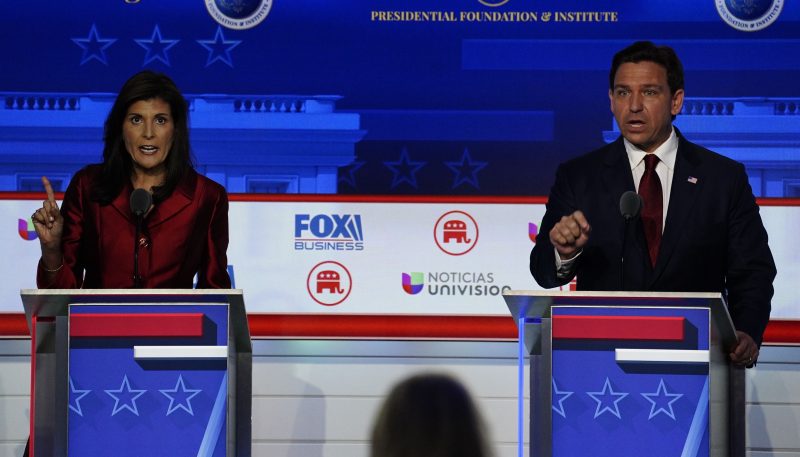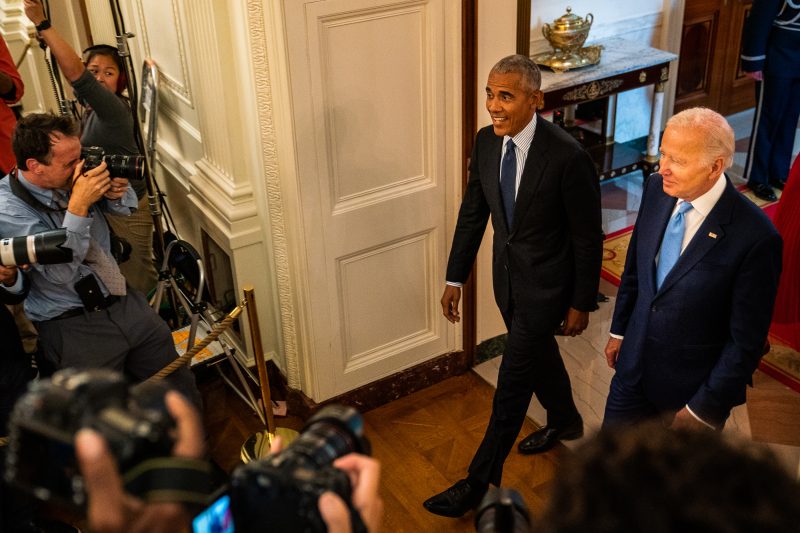Republican debate brings chaos, attacks and a slog for second place

SIMI VALLEY, Calif. — The second Republican presidential debate was sometimes an echo of the first — chaotic and filled with crosstalk, with the moderators struggling to take control. But the targets of attacks were different. They went after one another, but chose more to criticize President Biden, politicians in Washington and, occasionally, former president Donald Trump.
Over the course of the two-hour session at the Ronald Reagan Presidential Library, the Republican candidates attacked Biden on the economy and inflation, on immigration and the flow of undocumented immigrants at the U.S.-Mexico border, and almost every other issue that the moderators from Fox Business and Univision threw at them.
“The people in Washington are shutting down the American Dream with their reckless behavior,” Florida Gov. Ron DeSantis said. “And where’s Joe Biden? He’s completely missing in action from leadership. And you know who else is missing in action? Donald Trump should be on the stage to defend his record.”
With Trump dominating the Republican race, the goal for all the other candidates now is playing for second, to position themselves in the eyes of voters as the alternative to the front-runner and to convince Republican primary voters that they could best lead the party to victory in the 2024 general election.
Midcourse corrections from the first encounter last month were apparent as the debate unfolded Wednesday night.
Entrepreneur Vivek Ramaswamy, who presented himself as a man with all the answers in the first debate, tried to humble himself in the second one, saying that he may come off as a young man in a hurry, but that he knows he doesn’t have all the answers.
Sen. Tim Scott of South Carolina, who was a bystander through much of the first debate, was more assertive from the opening bell and even leveled the first attack on Ramaswamy. He hit Ramaswamy for having said in the last debate that the other candidates were all bought and paid for by bringing up the entrepreneur’s business ties to China. And he took punchy shots at Biden, too.
“Joe Biden should not be on the picket line,” Scott said, referring to the president’s visit to Michigan on Tuesday to appear with striking autoworkers. “He should be on the southern border working to close our southern border.”
DeSantis, also sometimes absent in the first debate as others on the stage squabbled, found more ways to break into the conversation to assert himself and push forward his claim that he would reverse what he said is America’s decline by using tough-minded policies and leadership.
Meanwhile, former U.N. ambassador Nikki Haley, who was sharp in the first debate, was similarly sharp on Wednesday night, whether on foreign policy or in bringing down Ramaswamy during several fractious exchanges.
But the former South Carolina governor found another target when she attacked DeSantis over energy policy. The issue was less important than the sense that he among the others on the stage might still, despite many problems throughout the year, be best positioned to challenge Trump. She didn’t stop there, choosing near the end of the debate to go after fellow South Carolinian Scott, claiming that he has accomplished little during his time in office.
Other candidates followed much the same script in the second debate as in the first.
Former vice president Mike Pence sought to prove that there is an audience in the Republican Party for the kind of traditional conservatism that was embodied by Reagan when he was president four decades ago.
Former New Jersey governor Chris Christie continued to play the role of Trump antagonist — daring the former president to join future debates by staring into the camera, addressing him as if he were a television viewer, and claiming that he should be known as “Donald Duck” for not engaging with those seeking to bring him down.
No single debate will elevate one of Trump’s rivals above all others. The second debate, as with the first, was a reminder of the distance they have to go to turn the nominating contest from a runaway into a race. But Wednesday’s session provided more clues to the state of the race, especially in how the candidates assess their own standing compared with others.
Trump remains dominant nationally and in the states with early contests, despite or perhaps because of his legal problems, and the rest of the candidates continue their chase.
Attention after the first debate put spotlights on DeSantis, Ramaswamy and Haley, all for different reasons. The little-known Ramaswamy made himself the focus of attention — and the target of attacks from others — as he attempted to dominate the debate. Instant reactions were positive. In an overnight poll by The Washington Post, FiveThirtyEight and Ipsos, he was one of the winners.
But Ramaswamy has made no real progress with voters, and it looks as if the impression he made did as much damage as help. He is in single digits in poll averages nationally and single digits in the most recent CBS-YouGov polls in Iowa and New Hampshire. A Public Opinion Strategies survey of Iowa Republicans for the group Citizen Awareness Project also noted that his negatives have risen since the debate.
Haley delivered among the most telling put-downs of Ramaswamy and distinguished herself in contrast to her male counterparts with a crisp presentation overall. She seemed best positioned after that debate to make a move. She has risen some, but not significantly. She remains in single digits nationally, based on The Washington Post’s average of polls. In Iowa, she is on the cusp of double digits, depending on the survey, but whether she has any real momentum is questionable.
DeSantis stayed out of the most acrimonious exchanges in the first debate, but he also went long stretches without saying much. He has drawn more negative coverage through the course of the campaign than any of the others on the stage on Wednesday, and his overall standing has dropped since the beginning of the year. Some post-debate commentary questioned whether he had done what he needed at a time when there were doubts about his candidacy.
Still, with Trump absent, he was judged the winner, according to The Post-FiveThirtyEight-Ipsos survey. In Iowa, according to the recent Public Opinion Strategies poll, DeSantis’s favorable ratings now are the equal of Trump’s. And while still far behind Trump there, he is in second place in both Iowa and New Hampshire, and in Iowa he is well ahead of the rest of the field.
Whoever is judged the winner of the second debate will enjoy accolades for a few days and might see a brief increase in standing. But if history is a guide, the lasting impact of a good performance can be fleeting. That’s a reason to be cautious about the effect of Wednesday’s debate.
As Republican strategist Karl Rove said on Fox News just before the debate started: “This is a process, not an event.” By that he meant the debate is only a step toward the moment when voters begin to cast their votes. A poor performance can hurt a candidate, but debates rarely do much to boost a candidate’s standing. Playing for second behind Trump’s lead is the goal for now.




